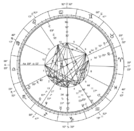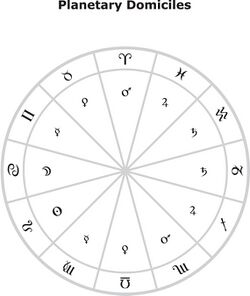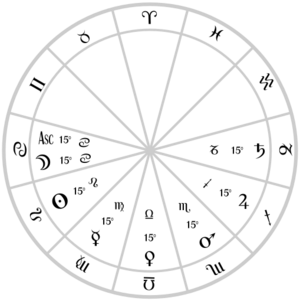Unsolved:Domicile (astrology)
| Astrology |
|---|
 |
| Background |
| Traditions |
| Branches |
In astrology, a planet's domicile (or less commonly house, not to be confused with the astrological house system) is the zodiac sign over which it has rulership. This is a separate concept from the houses of the horoscope. A planetary ruler is given to each sign, over which the planet is said to have a more powerful influence when positioned therein. A planet is considered to be in domal dignity when it is positioned in the sign it rules. This is the strongest of the five essential dignities of a planet.
The assignments of the ruling planets appear to be based upon the Northern Hemisphere seasons, as the sun (Sol) and the moon, the principal bearers of light and heat, were awarded to Leo and Cancer, respectively, since the months the sun passed through these signs (in ancient times) were the warmest and had the longest days.
Conversely, Saturn, the most distant (and hence the "coldest") of the planets known to ancients, was accorded the rulership of Aquarius and Capricorn, the signs opposite Leo and Cancer, respectively.
Jupiter, being next farthest away, was given the signs on either side of Aquarius and Capricorn (Pisces and Sagittarius), and Mars, next in order, received the next two (Aries and Scorpio).
Since Mercury never appears more than one sign from the sun in either direction, it was deemed to rule the two signs on either side of Leo and Cancer (Virgo and Gemini), and since Venus can never be found more than two signs from the Sun, it obtained the rulership of Libra and Taurus.
The discovery of planets outside of the geocentric field of vision in modern times provided a dilemma for astrologers, which most eventually resolved by a general consensus declaring Uranus to be Aquarius's ruling planet, while assigning Neptune to Pisces and later, Pluto was given to Scorpio.
Some modern authorities uses the concept of "night rulerships" to find room for the additional dignities. Uranus was designated the day ruler of Aquarius while Saturn was to be its night ruler. Similarly, Neptune was the day ruler of Pisces, leaving Jupiter as the night ruler, and Pluto was the day ruler of Scorpio with Mars as the night ruler. This notion probably had its origin in the concept of astrological sect, but this was the only vestige of sect in the modern tradition. Unfortunately, no allowance was made for these modern suggestions in the complex traditional doctrine of essential dignities, but the idea was very popular.
The use of dual rulerships in a manner such as this was also be known as "co-rulership". Some astrologers believed that the new co-rulers were primary rulers of the signs with which they were associated and might have been sole rulers of those signs, and if that was the case, two other planets, one linked to Libra or Taurus, and the other to Virgo or Gemini, may await discovery, thus eliminating the need for dual rulership of a sign altogether. Although the status of Ceres is unknown at the moment in astrology, due to its new definition as a dwarf planet, it has been suggested as the ruler of Virgo or Taurus. For some modern astrologers it is the ruling planet of Virgo and co-ruler of the 6th house with Mercury, and for some others the ruling planet of Taurus and the 2nd house with Venus.The possibility exists that it isn't involved with any sign, but in any event, it can almost definitely be attributed to the Earth element.

Rulership of houses
Many modern astrologers assign what is called a "natural" rulership of each house of the horoscope to a different planet, in the same way as the zodiac signs are said to have rulers. Traditionally, however, rulership of houses was understood to apply only in the individual birth-chart, in what is called an "accidental" rulership. In this case, co-rulership of a house in the "native's" horoscope is shared by planets that rule the sign on the cusp and any sign intercepted within the house and planets occupying that house. There are several different scenarios that one can use to determine rulership of a house:-
- If by chance the first house cusp is, say, 0 degrees Aries and the second house cusp is 0 degrees Taurus, the house will be ruled solely by Aries.
- If, for example, the second house cusp is 0 degrees Taurus and the third house cusp is 5 degrees Gemini then the house will have Venus as its primary ruler and Mercury as its secondary ruler.
- If, as an example, the fourth house cusp as 27 degrees Libra on it and the fifth house cusp has 8 degrees Sagittarius then the house will be intercepted. It will have Venus as its primary ruler, but in addition to Venus, Pluto, Mars, and Jupiter will be secondary rulers.
When a person attempts to determine the rulership of a house, the more planets or bodies that rule that house will reveal its complexity. Generally, the sign on the cusp will be the outward representation of the rulership, but the ruler of the sign inside the house will not be readily apparent, but will manifest itself at critical points in a person's life.
As in the case of intercepted houses, the sign that is in the middle of the house is the sign that the native must transcend before he can progress to the next phase of the house's rulership. Therefore, as in the previous example, if a house is intercepted with the sign of Scorpio then the native must will be initially presented with many Libran qualities, but must work through those very intense issues of sex, death and regeneration before he will be able to enjoy the benefits of Jupiter, which will be the last and ultimate state the native must work through before he has fully experienced all of the aspects of that house.

Rulerships of signs
| House | Sign Domicile | Ruling planet (ancient) |
Ruling planet (modern) |
Sign Detriment |
|---|---|---|---|---|
| 1st | Aries | Mars | Libra | |
| 2nd | Taurus | Venus | Ceres | Scorpio |
| 3rd | Gemini | Mercury | Sagittarius | |
| 4th | Cancer | Moon | Capricorn | |
| 5th | Leo | Sun | Aquarius | |
| 6th | Virgo | Mercury | Pisces | |
| 7th | Libra | Venus | Aries | |
| 8th | Scorpio | Mars | Pluto | Taurus |
| 9th | Sagittarius | Jupiter | Gemini | |
| 10th | Capricorn | Saturn | Cancer | |
| 11th | Aquarius | Saturn | Uranus | Leo |
| 12th | Pisces | Jupiter | Neptune | Virgo |
- No consensus has been reached by astrologers accepting the so-called "modern" rulership of either Ceres or Earth in lieu of traditional, rather than 'ancient', rulers. A distinction must be made between 'ancient', traditional, and modern rulerships, particularly in light of the fact that ancient astrology is not known to have assigned what we commonly think of as domicile rulerships. It isn't until Hellenistic astrology and afterwards that you begin to see domicile rulers, let alone domicile rulers of houses.
Furthermore, the ancients assigned domal dignity to the North and South nodes of the Moon, although these do not qualify as rulerships since the nodes do not have governance over any signs. However, the nodes are said to act more comfortably and reliably in those places:
- North node in Gemini
- South node in Sagittarius
Some discontent exist within the Western astrological community about some of the signs that are often still said to share rulers. Many suggestions have been made, but consensus could actually take centuries, as it did in the cases of Uranus and Neptune.[citation needed]
Dispositors
A dispositor is a delineation of planetary rulership in relation to the signs. For instance if Mercury is in Libra, its dispositor is Venus, if Venus is in turn in Sagittarius, its dispositor is Jupiter, and if Jupiter is Cancer its dispositor is the Moon. This process continues until there is a final dispositor (sign in its own rulership) or it circles around in a never ending chain of command.[1]
Usage
Classical astrologers whose methods are rooted in traditional methods do not use any of the outer planets not recognized by the ancients as the rulers of any of the 12 signs, preferring the traditional rulership scheme.
On the other hand, most modern, psychologically-oriented astrologers do use the outer planets as ruling planets of those particular three signs listed above. Many others also use the ancient rulers while using the modern planets as the co-ruler of those signs.
Other astrologers do not use any of the planets as sign rulers (Cosmobiologists, Uranian astrologers, Hamburg School of Astrology, other groups/individuals), preferring to focus more on the astrological aspects and other portions of the horoscope instead.
Most astrologers practicing Vedic astrology (Jyotish) only use the traditional rulership system and have been doing so consistently for quite some time.
See also
- Planets in astrology
- Exaltation
- Astrological sign
- Horoscope
- Solar system in astrology
- Asteroids in astrology
References
External links

